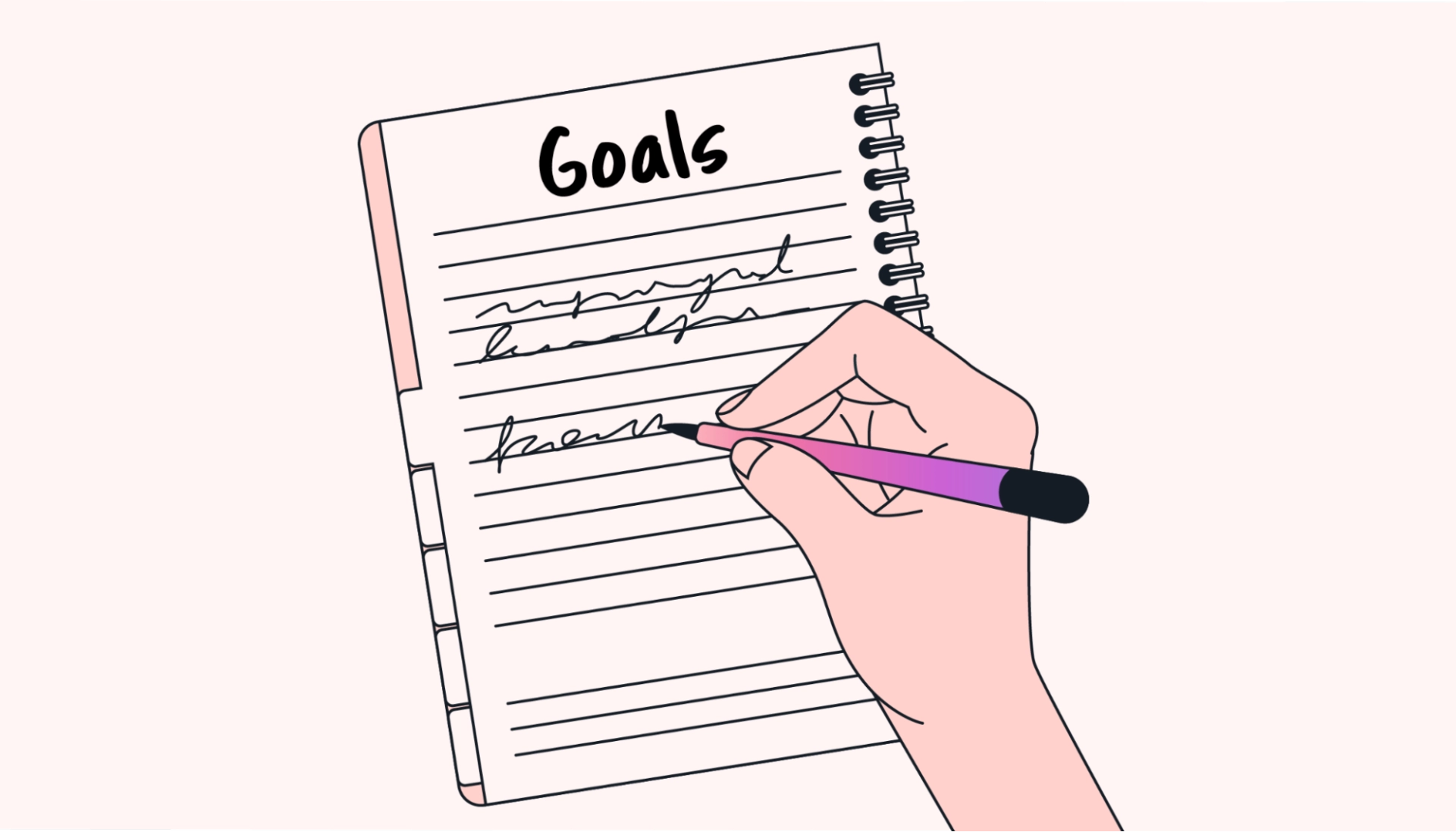Staying disciplined is tough. Whether it’s showing up to the gym or sticking to a project deadline, it requires a lot of willpower.
But while it's hard to stay disciplined all the time, especially when life throws distractions and temptations at us, the payoff can be huge. Being disciplined helps us achieve our goals.
To give you some inspiration and practical advice, we've put together a list of practical self-discipline examples and some tips to help you stay on track.
What is self-discipline, and why is it important?
Self-discipline is the ability to push yourself forward, stay motivated, and take action no matter how you're feeling physically or emotionally. It's about being able to set long-term goals and work toward them without getting sidetracked by short-term gratifications.
Self-discipline forms the foundation of good habits and success. It keeps you on track, helps you avoid distractions, and makes it possible for you to achieve your long-term goals. Whether you’re aiming to improve your physical or mental health, advance in your career, or learn a new skill, self-discipline acts as the driving force behind your persistence and progress.
16 self-discipline examples
So, how do you show self-discipline? And what does being self-disciplined look like in everyday life?
Here are 16 personal self-discipline examples to inspire you:
1. Save for a downpayment on a house
Saving for a downpayment on a house requires careful budgeting and long-term planning. It starts with evaluating your income and expenses. Then, you’ll set a realistic savings goal based on the price range of the types of homes you're interested in.

This might involve cutting unnecessary expenses, such as dining out. You might also want to set up an automatic transfer to a savings account specifically for your downpayment.
2. Join the 5 AM Club
Joining the 5 AM Club means waking up at 5 AM every day to dedicate the first few hours of your day to personal development activities, such as exercising, reading, or meditating. In doing so, you can accomplish more and feel more energized. This healthy habit also gives you quiet, distraction-free time for focusing.
3. Allocate 10 to 12 minutes each morning to plan your day
Planning your day every morning can improve your productivity and reduce stress. According to author Brian Tracy in his book Eat that Frog!, spending just 10 to 12 minutes doing this — which might include reviewing your to-do list, prioritizing your tasks, and allocating time blocks for tasks — can save you two hours daily.
If you’re a project manager, for instance, you could use your 10 to 12 minutes to review your calendar, prioritize tasks based on their urgency and importance, and mentally prepare for meetings. This will make your workday more structured and efficient.
4. Read at least one book each month
Committing to reading at least one book per month encourages continuous learning and personal growth. In fact, just 15 minutes of daily reading can make you feel 69% more accomplished, 55% more relaxed, and 33% happier.
5. Walk or bike to complete errands within a mile of your house
Thinking about hopping in the car for a quick errand or even your daily commute? If your destination is within a mile of your home, why not switch gears and go by foot or bicycle instead?

Cycling for 20 minutes or walking for 30 minutes most days reduces your mortality risk by at least 10%. Not only that but choosing to walk or bike for short errands also reduces your carbon footprint. Specifically, through active transport like walking and bicycling, you can reduce your emissions by 14.52% for short car trips and 3.66% for short walking trips.
6. Meditate for 10 minutes every day
A daily 10-minute meditation session can significantly reduce stress and improve mental clarity. It's a commitment to pausing and focusing on the present so that you can clear your mind and take a calm, focused approach to preparing for the day.
7. Eat at least five portions of fruits and vegetables every day
Consuming the right amount of fruits and veggies every day isn't just good advice from your mom — it's solid science. Eating at least five portions daily is associated with a decreased risk of heart disease, type 2 diabetes, and certain types of cancers.
8. Exercise for at least 30 minutes every day
Daily exercise for at least 30 minutes can improve your cardiovascular health, mood, and weight management. Whether it's a brisk walk, a yoga class, or a gym session, consistent physical activity is key to optimal health.
9. Commit to tech-free Sundays
Designating Sundays as tech-free encourages more meaningful interactions and activities. You can spend them by participating in outdoor activities, reading, or sharing time with loved ones.

10. Practice the 2-minute rule for tasks
The 2-minute rule states that if a task takes less than two minutes to complete, do it immediately. This principle can help prevent procrastination and keep spaces tidy. Plus, you can apply it to both your work and personal life. Complete quick emails and household chores to reduce clutter and backlog.
11. Commit to a zero-waste day each week
A zero-waste day means producing no trash that will end up in a landfill. It encourages recycling, composting, and mindful consumption.
Focus on using reusable items and avoiding packaged goods for a more sustainable lifestyle.
12. Turn off all electronics an hour before bed
Turning off electronics an hour before bed promotes better sleep quality by reducing blue light exposure, which can interfere with melatonin production. Replace your evening screen time with reading for a more restful night.
13. Introduce a “mindful minute” before meals
Taking a "mindful minute" before eating means pausing to appreciate your food and becoming more present prior to your meal. The simple practice has many benefits, including better digestion and a healthier relationship with food.

One study even suggests that people with irritable bowel syndrome (IBS) can use mindfulness to better deal with their symptoms. Instead of getting upset or stressed when they feel uncomfortable, mindfulness can help them notice and accept their feelings without adding extra worry.
To practice mindful eating, take deep breaths and express gratitude for your food before eating. Reflecting on the way you think and feel as you’re eating also minimizes distractions like TV or checking your phone.
14. Reduce clutter with the “one in, one out” rule
The "one in, one out" rule works like this: for every new item you bring into your home, you donate, sell, or recycle another item you already have. This practice encourages thoughtful consumption and keeps your living space organized and clutter-free.
15. Spend 2 hours a week on a passion project
Dedicating at least two hours a week to a passion project or hobby can give you a sense of fulfillment and creativity. It could be anything from painting or gardening to coding or writing. Allocating time to work on personal projects not only lets you improve your skills but also gives you a therapeutic outlet.
16. Apply the 24-hour rule in your decision-making
The 24-hour rule involves waiting for 24 hours before making a significant decision, especially one that’s driven by impulse or emotion. This period allows for thoughtful consideration, potentially saving you from regret.

For example, before accepting a job offer, wait 24 hours to consider everything the job will involve and ensure your decision aligns with your long-term goals and values.
Tips for building your self-discipline
Self-discipline is a crucial skill that can help you achieve your goals and improve your overall quality of life. Here are several effective tips to help you develop and strengthen your self-discipline:
Set clear goals
Without a specific destination in mind, it's easy to drift off course. Start by identifying what you want to achieve in both the short term and the long term. These goals should be specific, measurable, achievable, relevant, and time-bound (SMART).

For example, instead of saying, “I want to get fit,” set a goal like, “I aim to run a 5K in under 30 minutes by the end of the year.”
Break goals into manageable tasks
Large goals can often feel overwhelming, making procrastination more tempting. So, break them down into smaller, manageable tasks that you can tackle one at a time. This approach makes your goals less daunting and provides a clear roadmap of what needs to be done. Each task you complete is one step closer to your ultimate goal and a small self-discipline victory.
Create a plan
Having a plan is what distinguishes a dream from a goal. Outline the steps you need to take to accomplish your tasks. A well-structured plan considers your daily routines, deadlines, and potential challenges. It also includes contingencies in case things don't go as expected.
Limit distractions
Distractions are everywhere in today’s world, and resisting them requires a conscious effort. Identify the ones you face most often and develop strategies to minimize them. This might mean turning off notifications on your phone, setting specific times for checking emails, or finding a quiet place to work.
The fewer distractions you have, the easier it will be to maintain focus and discipline.
Practice delayed gratification
The ability to delay gratification is a hallmark of self-discipline. It means prioritizing long-term benefits over short-term pleasures.
Delayed gratification can be practiced in small ways, like resisting the urge to check your social media pages while working, or in larger life decisions, such as saving money for the future instead of spending it on immediate wants.
Over time, this practice strengthens your self-discipline muscle, making it easier to make decisions that align with your goals.
Be patient and persistent
Improving self-discipline doesn't happen overnight. Focus on the small daily steps you can take toward your goals — and remember that every bit of progress counts.
When you face setbacks, try to see them as opportunities to learn and grow rather than reasons to give up. Keep your long-term goals in mind, but concentrate on what you can do right now to move closer to them. Stay consistent, and don’t be too hard on yourself if things don't go as planned.
Improve your self-discipline abilities with Motion
By incorporating all these strategies into your daily life, you can strengthen your self-discipline over time.
Remember, self-discipline is not about being overly harsh or restrictive with yourself — it's about making consistent choices that lead you to your long-term goals and improve your life as a whole.
It’s easier to bring self-discipline into your personal and professional life with help from the right tools. Motion’s sophisticated AI features offer more than task organization; they’re a foundation for turning your self-discipline goals into actions. Through intelligent task sorting, adaptive scheduling, and more, Motion simplifies day-to-day planning. It gives you the headspace and time to build a disciplined approach to your responsibilities.

Jodi Monroe is a content writer and blogger in the SaaS space. When not at her laptop, she’s planning her next travel adventure.




